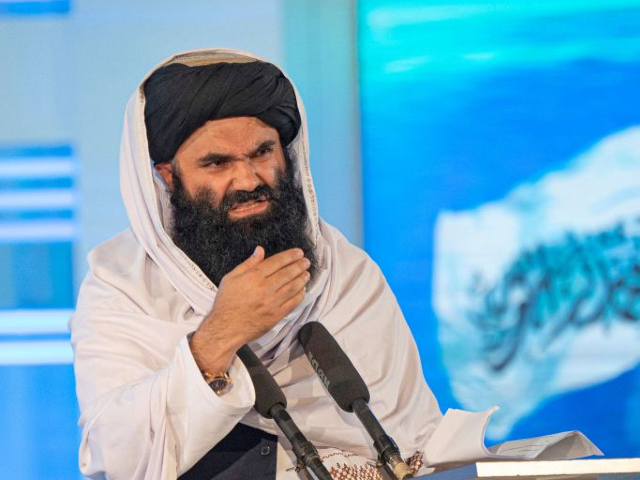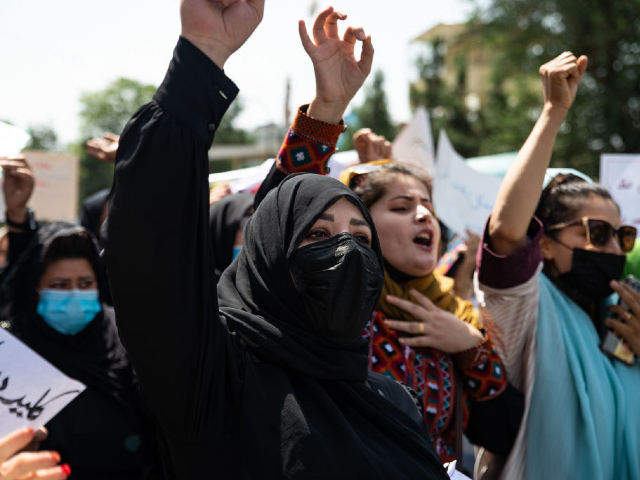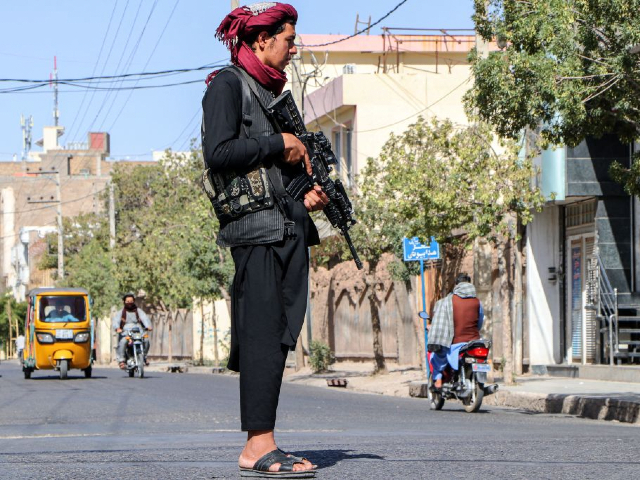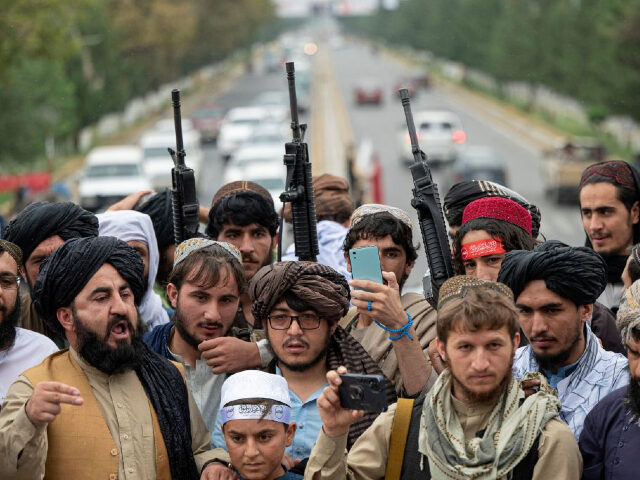One year after President Joe Biden’s catastrophic withdrawal from Afghanistan, and two weeks after Al-Qaeda leader Ayman al-Zawahiri was liquidated by a U.S. airstrike while living as a guest of the Taliban in Kabul, it’s worth taking a look back at the February 2020 decision by the New York Times to give top terrorist leader Sirajuddin Haqqani space to explain “What We, the Taliban, Want.”
The New York Times (NYT) faced heavy criticism at the time for granting Haqqani space to publish Taliban propaganda. Haqqani was, and remains, a terrorist leader wanted by the FBI. He was the operational commander of the Haqqani Network, the most dangerous militant organization in Afghanistan and a criminal gang with a long record of kidnapping foreigners for profit, including Americans.

Taliban Interior Minister Sirajuddin Haqqani speaks during a ceremony marking the 30th anniversary of the Mujahideen, the 8th of Saur 1371 (28 April 1992) victory over the government of communist regime, in Kabul on April 28, 2022. (Photo by Wakil KOHSAR / AFP) (Photo by WAKIL KOHSAR/AFP via Getty Images)
The Haqqani Network, a designated Foreign Terrorist Organization founded by Sirajuddin Haqqani’s father Jalaluddin in the 1980s, has strong ties to al-Qaeda and is fused almost seamlessly with the Taliban. In one of its many embarrassing pratfalls after the fall of Kabul in 2021, the Biden administration bizarrely claimed the Haqqanis were completely unrelated to the Taliban – a bit of desperate media spin intended to obscure the fact that Biden had just given Afghanistan to al-Qaeda’s best friends. Within a matter of weeks, half of the high officials in the Taliban’s “Islamic Emirate of Afghanistan” were named Haqqani.
That includes Sirajuddin, who became the “interior minister” and deputy leader of the Islamic Emirate. After Zawahiri was located in a Kabul safe house and eliminated by drone strike, the White House said “some senior leaders of the Haqqani Network” were aware of his presence. The Haqqanis worked furiously to cover up their knowledge of Zawahiri’s whereabouts and sanitize the scene of his death.
The White House added that Zawahiri was “actively involved in planning and plotting threats against our homeland,” so his safe house in Kabul was not a retirement villa.
Sirajuddin Haqqani’s February 2020 op-ed for the NYT painted the Taliban as a peace-loving group of aspiring statesmen who just wanted the “killing and maiming” to stop.
“We did not choose our war with the foreign coalition led by the United States. We were forced to defend ourselves. The withdrawal of foreign forces has been our first and foremost demand,” Haqqani wrote, gliding past the Taliban’s cooperation with al-Qaeda as the reason for invading Afghanistan.
In a key passage of his NYT piece, Haqqani dismissed concerns about the Taliban harboring al-Qaeda and other terrorist groups as “politically motivated exaggerations by the warmongering players on all sides of the war.”
“It is not in the interest of any Afghan to allow such groups to hijack our country and turn it into a battleground. We have already suffered enough from foreign interventions. We will take all measures in partnership with other Afghans to make sure the new Afghanistan is a bastion of stability and that nobody feels threatened on our soil,” he pledged.
Haqqani risibly claimed the Taliban would create “an Islamic system in which all Afghans have equal rights, where the rights of women that are granted by Islam – from the right to education to the right to work – are protected, and where merit is the basis for equal opportunity.”

KABUL, AFGHANISTAN – AUGUST 13: Taliban fighters fired into the air as they dispersed a rare rally by women as they chanted “Bread, work and freedom” and marched in front of the education ministry building, days ahead of the first anniversary of the hardline Islamists’ return to power, on August 13, 2022 in Kabul, Afghanistan. The collapse of the economy and the freezing of Afghan and donor funds after the Taliban takeover of the country in August 2021 created a humanitarian crisis. Most art, culture and pastimes have been banned. The female population have also had to quit jobs and young girls after the age of 12 can no longer go to school or complete further education. (Photo by Nava Jamshidi/Getty Images)
In reality, as the NYT grimly chronicled in a Friday piece called “Taliban Rewind the Clock: ‘A Woman Is a Helpless and Powerless Creature,” Haqqani’s thuggish regime created exactly the kind of medieval tyranny feared by human rights advocates:
Girls are barred from secondary schools and women from traveling any significant distance without a male relative. Men in government offices are told to grow beards, wear traditional Afghan clothes and prayer caps, and stop work for prayers.
Music is officially banned, and foreign news broadcasts, TV shows and movies have been removed from public airwaves. At checkpoints along the streets, morality police chastise women who are not covered from head to toe in all-concealing burqas and headpieces in public.
A year into Taliban rule, Afghanistan has seemed to hurtle backward in time. The country’s new rulers, triumphant after two decades of insurgency, have reinstituted an emirate governed by a strict interpretation of Islamic law and issued a flood of edicts curtailing women’s rights, institutionalizing patriarchal customs, restricting journalists and effectively erasing many vestiges of an American-led occupation and nation-building effort.
In his 2020 op-ed, Sirajuddin Haqqani claimed the Taliban wanted to keep “the international community interested and positively engaged during the transition to peace,” but in practice that has meant disregarding every human rights demand from the United Nations, and essentially threatening to let impoverished Afghans die in droves if humanitarian money stops flowing into the country.
“The future is immensely bleak for Afghans if more is not done by the international community to ensure the Taliban changes its modus operandi and complies with its human rights obligations,” a panel of U.N. experts said on Friday, without explaining what anyone could do to make the brutal Islamic Emirate change its ways.
The panel did, however, complain about “the interruption of international assistance and the freezing of Afghan assets abroad.” The Taliban’s strategy of taking its own population hostage appears to be working.
“Despite making numerous commitments to uphold human rights, the Taliban have not only failed to deliver on their promises, they have also reversed much of the progress made in the past two decades,” the panel said.
“Nowhere else in the world has there been as wide-spread, systematic and all-encompassing an attack on the rights of women and girls – every aspect of their lives is being restricted under the guise of morality and through the instrumentalization of religion,” it noted.

A Taliban fighter stands guard at a checkpoint in Herat on August 15, 2022. – Taliban fighters chanted victory slogans next to the US embassy in Kabul on August 15 as they marked the first anniversary of their return to power in Afghanistan following a turbulent year that saw women’s rights crushed and a humanitarian crisis worsen. (Photo by Mohsin Karimi / AFP) (Photo by MOHSIN KARIMI/AFP via Getty Images)
“Indeed, the daily reports of violence – including extra-judicial killings, disappearances, arbitrary detention, torture, heightened risks of exploitation faced by women and girls including for the purposes of child and forced marriage, and a breakdown in the rule of law – gives us no confidence that the Taliban has any intention of making good on its pledge to respect human rights,” the panel declared.
The U.N. report also pointed to the Taliban’s apparent harboring of Zawahiri as a potential violation of international law, but the only remedy it could suggest was denying the Taliban regime “recognition” as a legitimate government.
Senior U.N. relief coordinator Ramiz Alakbarov said on Monday that the “scale of suffering in Afghanistan continues to rise across many areas since the Taliban advanced on Kabul last summer.”
“Over half of the country’s population now live below the poverty line. Nearly 23 million people are food insecure, many of them severely so, and more than two million children are suffering from malnutrition,” Alakbarov said, noting these conditions greatly magnified the suffering from natural disasters such as the June earthquake in central Afghanistan.
Comparing the grim realities of 2022 Afghanistan to the promises Sirajuddin Haqqani made in his 2020 op-ed would probably do little to shame Haqqani, which once again raises the question of why the NYT was willing to publish enemy propaganda.
The notion that hearing from a creature like Haqqani might offer valuable insights into the Taliban’s thinking appears to have been conclusively debunked. Nothing Haqqani wrote in that controversial opinion piece bears the slightest resemblance to what the Taliban actually did once Joe Biden handed it the keys to Afghanistan plus a gigantic arsenal of abandoned American hardware.

COMMENTS
Please let us know if you're having issues with commenting.